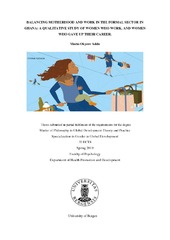| dc.description.abstract | Responsibilities of motherhood and climbing the career development ladder can be hectic because it entails a wide range of duties, including attending meetings, supervising children’s assignments, sending and picking children to and from school, among others. Since childbearing is of extreme importance in the Ghanaian society, some mothers are left with no choice than to sacrifice their careers. Well- educated women who have risen high on career ladders are confronted with gender- role conflict, causing some to quit or consider quitting their jobs. The intersection between motherhood and career conflicts is largely explored especially in literature on Western societies, however, the benefits women derive from playing both roles still remain scantly mapped, especially in sub- Saharan Africa. The main purpose of this study is to examine how Ghanaian women balance work in the formal sector and motherhood. Six dominant themes emerged from the analysis including motivating factors, coping mechanisms, social support and the conduciveness of organizational and governmental policies. This phenomenological study interviewed seven women- five working mothers and two mothers who quit their jobs in the formal sector. Using snowballing, respondents were selected from similar socio-economic backgrounds in Accra. The results showed that working mothers experienced some form of stress in integrating work and family roles, however, there were great satisfaction and fulfillment in being able to balance both roles. Their major challenge was the insufficient time they had with their children because of work and vice versa. Respondents suggested that the formal working environment, existing organizational and governmental policies needed amendments since they were not conducive for mothers. A major recommendation was to adopt family-friendly policies such as the establishment of baby nurseries and learning centers at the workplace, where children could be, during school vacations. The findings of this study are important to help promote gender equality and make it easier for women to combine motherhood and formal work. | en_US |
